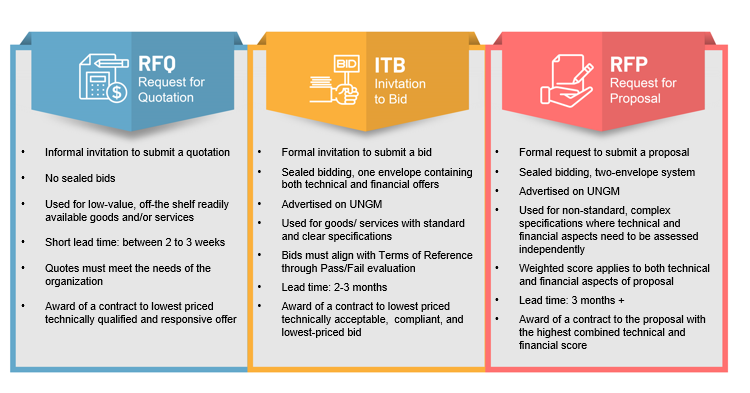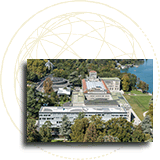Procurement at the WTO
The WTO Procurement Section is responsible for obtaining, in a timely and cost-effective manner, goods and services which meet the needs of the organization. These goods and services include, among others, informatics software and hardware, security products and services, reprographic and publishing equipment and material, various consulting services, as well as goods and services related to the functioning of the WTO buildings in Geneva.
Disclaimer:
The WTO reserves its right to publish a given request for Expression of Interest (EOI), Request for Quotation (RFQ), Invitation to Bid (ITB) or Request for Proposal (RFP) on the UNGM website based on the interest of the organization and at its sole discretion. The WTO shall accept no liability for not having placed a given EOI, RFQ, ITB or RFP on the UNGM website.
Throughout the entire procurement process, WTO applies the following principles:
a. Efficient and effective use of the Organization's resources
b. Non-discriminatory, fair, impartial and open competition
c. Transparency
d. Best value for money
e. Accountability
f. Integrity
g. Respect for the Organization's Regulations and Rules.
Business opportunities / Vendor registration
Suppliers interested in business opportunities with the WTO are invited to consult our tenders published on the United Nations Global Marketplace (UNGM).
The WTO encourages potential vendor to register at the basic level through the UNGM.
The system provides registered companies with secure access to information enabling them to participate in WTO tenders such as Expression of Interest (EOI), Request for Quotation (RFQ), Invitation to Bid (ITB) and Request for Proposal (RFP).
General Terms and Conditions of contracts entered into by the WTO
Gifts and hospitality
The WTO applies a "zero tolerance" policy to the staff involved in the procurement activities and expects suppliers not to offer any type of gift, favor or hospitality.
Procurement Method

UN Supplier Code of Conduct
The WTO requires that all bidders observe the highest standard of ethics during the solicitation process and the execution of work. Prospective bidders shall be aware that the WTO enforces a zero-tolerance policy concerning prohibited practices, including corruption, fraud, coercion, collusion, unethical behavior, and obstruction.
The WTO adheres to the United Nations (UN) Supplier Code of Conduct. Prospective bidders must therefore understand and accept that any submission sent to the WTO constitutes agreement to abide by the UN Supplier Code of Conduct. Accordingly, any company that is found to have undertaken unethical, unprofessional or fraudulent activities will be suspended and/or forbidden from continuing business relations with the WTO.
Find out more:
https://www.ungm.org/Public/CodeOfConduct
Sustainable Procurement
The WTO promotes sustainable procurement principles and encourages vendors to adopt these core values.
Find out more: https://www.ungm.org/Shared/KnowledgeCenter/Pages/SustainableProcurement
UN Global Compact
The WTO supports the UN Global Compact Initiative and encourages vendors to embrace these core values.
Find out more:
https://unglobalcompact.org/what-is-gc/mission/principles
Bid Debrief
The WTO offers vendors that participated in WTO high-value solicitations an opportunity to obtain additional information on their unsuccessful proposals or bids.
The Debriefing Procedure applies to proposals and bids submitted in response to solicitations by Request for Proposals (RFP) or Invitation to Bid (ITB) only.
Bid Protest
Vendors registered on the UN Global Marketplace who have participated in a WTO formal competitive procurement process (i.e., ITB or RFP) resulting in an award of more than CHF 200,000, and who have requested - and received - a formal debrief may submit a letter of protest, subject to the WTO Bid Protest Procedure.
Gender Responsive Procurement
Bidders are encouraged to become a signatory to the Women Empowerment Principles, a set of principles for business offering guidance on how to empower women in the workplace, marketplace, and community developed by the UN Global Compact and the UN Entity for Gender Equality and the Empowerment of Women ("UN Women").
Find out more:
https://www.weps.org/
